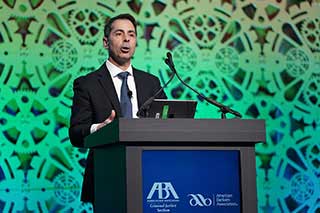
The Financial Crimes Enforcement Network, the U.S. Treasury agency that spearheads efforts to combat money laundering and other illicit uses of the financial system, has appointed its first digital innovation officer.
The appointee, Michael Mosier, is also deputy director, FinCEN director Kenneth Blanco said in a February 21 announcement. Mosier returned to FinCEN after a short stint with cryptocurrency analytics and compliance software firm Chainalysis. His additional title underlines a strategic thrust that is increasingly common at regulatory bodies and that includes a monthly innovation hours outreach program.
Mosier's predecessor as deputy director, Jamal El-Hindi, was named Treasury's interim chief data officer (CDO), with department-wide responsibilities for data and information strategies. A council of federal agency CDOs, organized under a national data strategy mandate, had its inaugural meeting on January 31. Another recent CDO appointment was Austin Gerig at the Securities and Exchange Commission.
FinCEN joined with U.S. depository institution regulators in a December 2018 statement “encouraging innovative industry approaches” to anti-money-laundering compliance. Speaking nine months later, El-Hindi explained that “we see great opportunities in working with industry on innovations that can help better detect and safeguard against illicit activity. In focusing on innovation, we want to examine how we can focus more industry and government resources on priority areas of national security and high-value illicit crimes.”
Valuing the Data
Over the past year, El-Hindi and Blanco have been calling attention to the BSA Value project, an effort to study and quantify the benefits of the 300 million-record Bank Secrecy Act database.

El-Hindi, who had joined FinCEN in 2006, said this February that two million Suspicious Activity Reports (SARs) are filed annually, and the database is queried an average of 7.4 million times per year. “Those queries touch an average of 18.2 million filings that are responsive or useful to ongoing investigations, examinations, victim identification, analysis and network development, sanctions development, and U.S. national security activities, among many, many other uses,” he told a meeting sponsored by the Securities Industry and Financial Markets Association.
In a December 2019 talk to the American Bankers Association/American Bar Association Financial Crimes Enforcement Conference, Blanco said a “'value chain' of BSA reporting is being developed for each type of stakeholder - FinCEN, law enforcement, industry, regulators and others.” More than 500 metrics were “being incorporated into the valuation model. We expect the model to show us the relative value of specific forms and even key fields - what is seen as more valuable and what is seen as less valuable.
“This value quantification model will help us assess how the regulatory and compliance changes we are considering making with our government partners will affect the value of BSA reporting - we want any changes to lead to more effective outcomes and increase the value of BSA reporting, not just provide greater industry efficiency.”
Engaging with Technology
FinCEN said that Mosier will “advance [its] engagement with emerging technology and financial innovation,” a remit much like those of Beth Knickerbocker, chief innovation officer of the Office of the Comptroller of the Currency, and Melissa Netram, director of the Commodity Futures Trading Commission's LabCFTC. Jelena McWilliams, chairman of the Federal Deposit Insurance Corp., said last year that a chief innovation officer was being sought to lead its FDiTech.
FinCEN director Blanco said that Mosier “brings a range of public and private sector experience that will help FinCEN proactively engage with industry and government partners to confront emerging threats and to capitalize on diverse opportunities in the financial and national security spaces. Michael is the right person, with the right skills, at exactly the right time.”
Mosier is a former associate director of Treasury's Office of Foreign Assets Control (OFAC), and deputy chief in the Department of Justice's Money Laundering and Asset Recovery Section. He also served as the White House National Security Council's director for transnational organized crime. He began his public service as a prosecutor with the Manhattan District Attorney's Office and has been an adjunct law professor at Georgetown University Law Center.
Blanco said in August 2018 that he was bringing Mosier into FinCEN as chief of strategic advancement and tactical development as part of a “forward-looking, cross-functional approach” to upgrade infrastructure and operational capabilities.
Virtual Currencies
In June 2019, Chainalysis announced Mosier's appointment as chief technical counsel, based in Washington, with Mosier saying he was looking to “help advance Chainalysis's mission to build trust in blockchains and help our customers meet their regulatory obligations.”
Speaking in that capacity last fall on cryptocurrency and digital asset regulation, as summarized by the Institute for Financial Markets, Mosier favored creation of an international baseline rather than rigid standards: “Let's set some basic principles and then allow for that evolution, allow for the product to shake out and see where the risks are. It should be risk-based, but we're still determining what the risks are. That differs for different jurisdictions.”
At a Chainalysis symposium in November, Blanco stressed FinCEN's clarity and consistency in addressing virtual currencies, in part through joint guidance with other agencies:
“First - FinCEN applies the same technology-neutral regulatory framework to any activity that provides the same functionality at the same level of risk, regardless of its label. It is not what you label it; it is the activity you actually do that counts.
“Second - Money transmission denominated in convertible virtual currency is money transmission pure and simple. Therefore, every regulatory requirement, piece of guidance, administrative ruling, or enforcement action ever conducted in the money transmission space has a bearing on transmittals of value denominated in convertible virtual currency.”
The FCA and Its Sandbox
Speaking on March 6 at the New York University School of Law, Therese Chambers, director of retail and regulatory investigations at the U.K. Financial Conduct Authority, largely agreed with FinCEN's Blanco on existing frameworks' applicability to digital assets and discussed her agency's “sandbox” innovation program.
“The risk of money laundering using crypto-assets is serious and real,” Chambers said.

She added that in practice, in the way decentralized digital asset networks are being used, “we see more similarities with traditional financial services. Surprisingly, as the market has evolved, the use of Bitcoin shifted from its intended use case as peer-to-peer digital cash, to something more akin to traditional financial services. Our consumer research found the majority of respondents saw crypto-assets as an alternative investment.”
Chambers said that the “well-worn logic” of anti-money-laundering and Know Your Customer procedures still holds true, and despite crypto's libertarian and cypherpunk roots, “the way the market has developed over the past decade now mimics several hallmarks of traditional financial services.”
For its engagement with innovators, “the FCA was the first to launch a regulatory sandbox,” Chambers noted. When firms demonstrate that users of a service stand to “benefit beyond what's possible in the market today, by using new technology or a novel business model, [then] they are admitted to a cohort to test it in a controlled environment. So far, crypto-assets in regulated financial activities have been used in around 40% of tests and are the single most popular technology for testing.”
Chambers pointed to some differences between the U.K. and U.S., such as in the way regulations define a “security,” and the fact that the Financial Conduct Authority “is like the Commodity Futures Trading Commission, Financial Crimes Enforcement Network and Securities and Exchange Commission combined.”
That said, “enhanced international cooperation is essential, as crypto firms are not constrained by borders whereas regulators are confined within a jurisdiction.”
Jeffrey Kutler of GARP edited this article and contributed additional reporting.